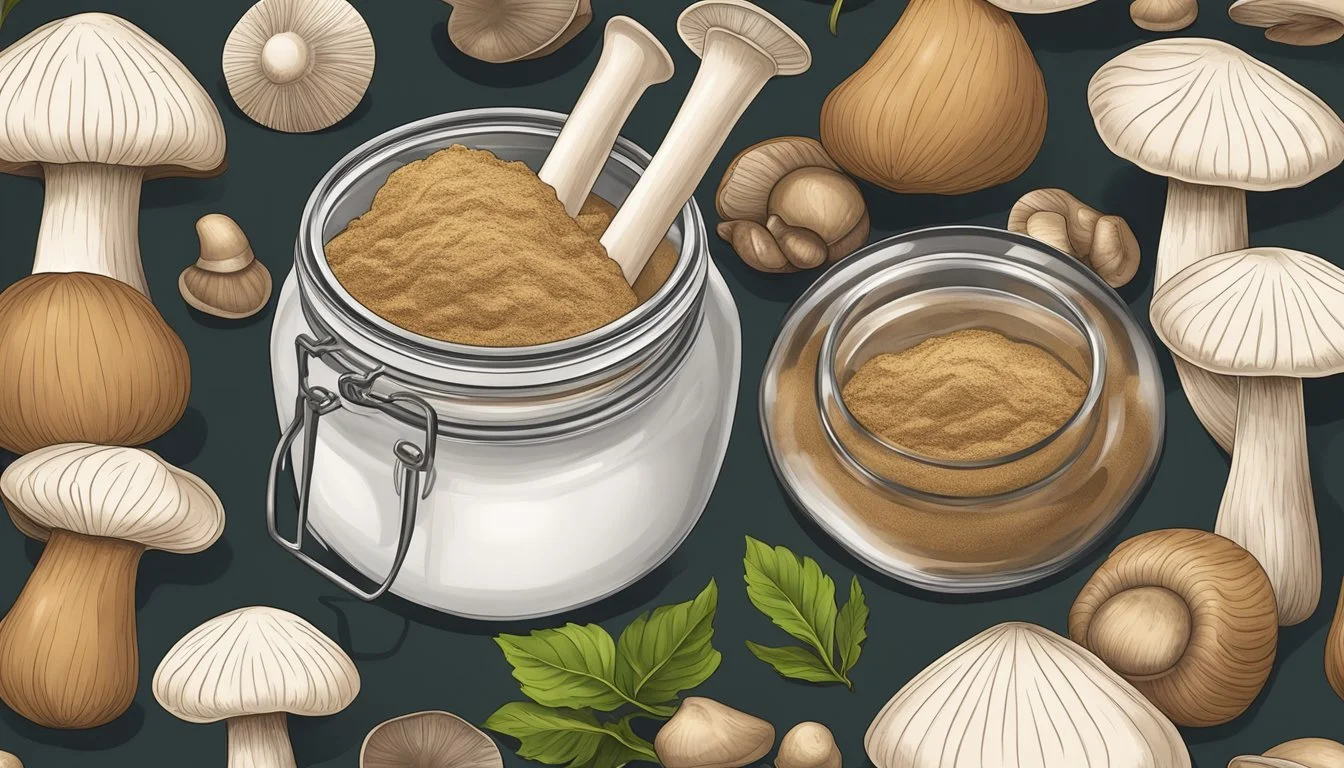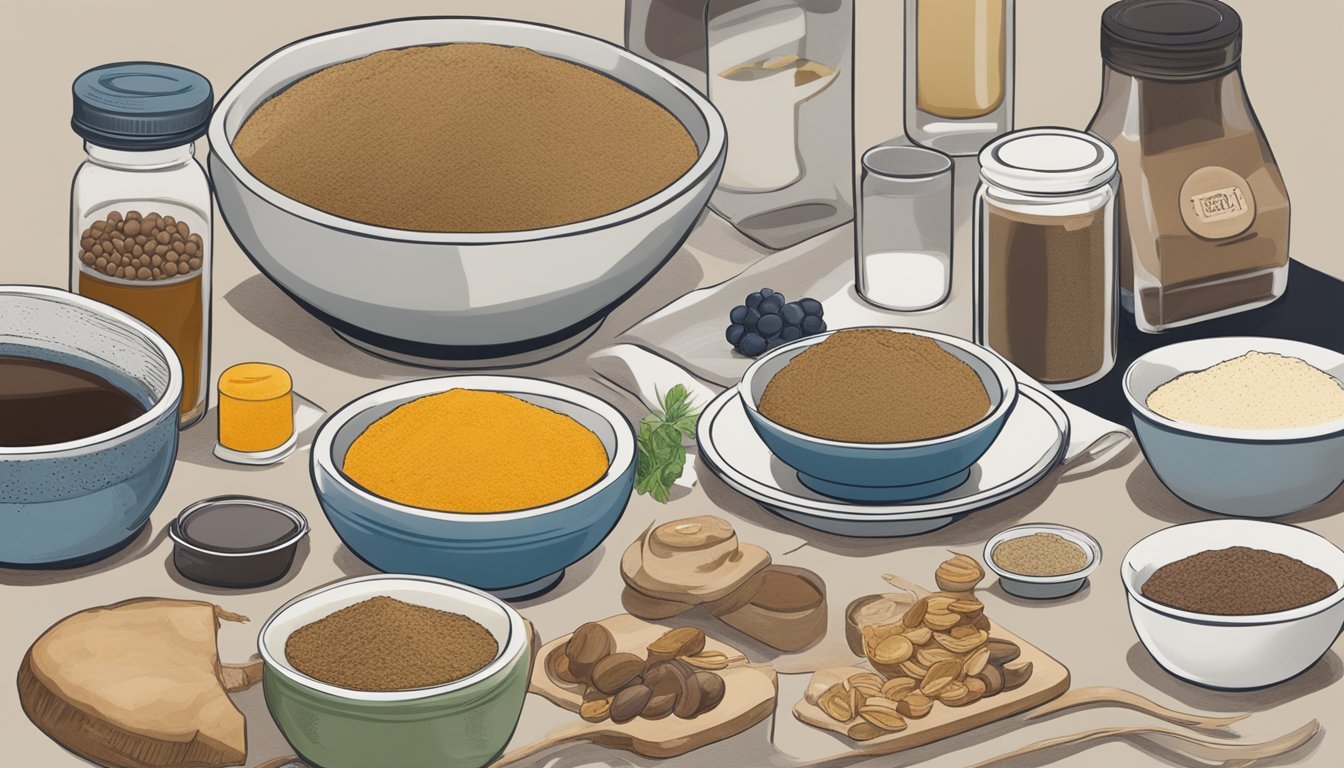Porcini Mushroom Powder Substitutes
Top Alternatives for Rich, Earthy Flavor
When cooking your favorite dishes, porcini mushroom powder is a go-to ingredient for adding rich, earthy umami flavor. However, there are moments when you might not have this aromatic powder on hand. Dried shiitake mushrooms are an excellent substitute for porcini mushroom powder, offering a similar meaty and earthy taste. They are readily available and can be ground into a fine powder for easy use.
Another alternative worth considering is dried thyme. Though it might seem unusual, its slightly pungent flavor can effectively mimic the unique taste of porcini mushrooms in various recipes. This versatile herb infuses dishes with an earthy aroma that can elevate the overall flavor profile.
For those looking for a fresh alternative, shiitake mushrooms are a stellar choice. They replicate the umami richness and meaty texture of porcini mushrooms, making them a valuable substitute in soups, stews, and sauces. Whether using dried or fresh alternatives, these substitutes ensure your culinary creations never lack depth and flavor.
Understanding Porcini Mushroom Powder
Porcini mushroom powder is derived from the porcini mushroom, a popular ingredient known for its rich, savory flavor.
This powdered form captures the umami and earthy aroma of the mushrooms, making it a versatile addition to various dishes.
Porcini mushrooms have a distinct taste that's often described as nutty and slightly woodsy. This complex flavor profile enhances soups, sauces, and stews.
Umami, the fifth taste, is prominent in porcini powder, contributing to a deep, savory experience that boosts the taste of many recipes.
Porcini powder is prized not only for its taste but also for its ability to intensify the flavors of other ingredients.
Cooks use it to add depth and complexity to dishes without overpowering them.
For those looking to replicate its flavor, substituting with the right ingredients can be crucial to maintaining that desired umami and aroma.
Top Porcini Mushroom Substitutes
When porcini mushroom powder is unavailable, several other options can effectively mimic its umami flavor and rich taste. Here are some top substitutes to consider, each with its unique characteristics that make them suitable replacements.
Shiitake Mushroom Powder
Shiitake mushrooms are among the best substitutes for porcini mushrooms. Their powder form retains the mushroom's umami flavor, which is comparable to that of porcini. Dried shiitake mushrooms offer a meaty texture and a slightly less earthy flavor.
For recipes, use shiitake mushroom powder in a 1:1 ratio to replace porcini powder. This substitute works well in soups, stews, and sauces, adding depth and richness to the dish. Shiitake mushrooms are also easy to find in most grocery stores, making them a convenient option.
Other Mushroom Varieties
Other mushroom types can also serve as excellent substitutes for porcini mushrooms. Some notable mentions are:
Button Mushrooms: Common and versatile, these can be used fresh or dried.
Cremini Mushrooms: These have a slightly stronger flavor than button mushrooms.
Oyster Mushrooms: They offer a delicate taste and soft texture.
Chanterelle Mushrooms: Known for their fruity aroma and firm texture.
Morel Mushrooms: These provide a robust, earthy flavor, perfect for hearty dishes.
When substituting, consider the flavor profile and texture you're aiming for. Each of these mushrooms brings a unique element to the recipes, so adjust the amounts according to taste.
Tomato-Based Substitutes
For a non-mushroom alternative, tomato paste is a surprising yet effective substitute. While it does not match the umami flavor of mushrooms, it adds a rich, deep flavor to dishes.
Tomato paste is particularly useful in recipes like stews and sauces, where its acidity can balance other flavors. Use it in smaller amounts, about half the volume you would with porcini powder, to avoid overpowering the dish. This substitute works well for those who need a vegan or allergen-free option.
Non-Mushroom Alternatives
For those who cannot find porcini mushroom powder or prefer non-mushroom substitutes, there are still plenty of ways to replicate the umami and earthy flavors in your dishes.
Truffle-Infused Options
Dried Truffles and Truffle Oil are excellent non-mushroom alternatives for porcini mushroom powder. They provide an elevated, earthy flavor, enhancing the umami profile of any dish.
Dried truffles can be ground into a fine powder and used similarly to porcini powder. They add a complex aroma and a rich taste that is highly desirable in gourmet cooking.
Truffle oil, whether white or black, can be drizzled over pasta, risottos, and soups. It imparts a deep, luxurious flavor, although it’s important to use it sparingly due to its potency.
Savory Plant & Vegetable Substitutes
Zucchini and Garlic Powder are viable plant-based options.
Zucchini offers a mild and slightly sweet flavor, and though not a direct taste match, it works well in dishes that require a subtle background flavor. Zucchini can be sautéed or roasted before incorporating it into recipes.
Garlic powder provides a strong, savory element that complements many dishes. It's especially useful for its pungent and slightly sweet aftertaste. While different from mushroom flavors, it still contributes significant depth to a recipe's profile.
Thyme and Dried Thyme are herbs that can mimic the earthy characteristics of porcini powder. Thyme has a slightly peppery and minty flavor that enhances the taste of meats, stews, and sauces.
Condiments & Sauces
Nutritional Yeast and Soy Sauce serve as condiments and sauces that replicate the umami aspect of porcini mushrooms.
Nutritional yeast is a deactivated yeast packed with nutrients and has a cheesy, nutty flavor. It works well as a seasoning in soups, gravies, and even sprinkled over popcorn for an umami kick.
Soy sauce is a liquid condiment that offers a rich, salty, and savory flavor. It's a versatile ingredient that can be added to marinades, stir-fries, and sauces. Soy sauce's umami properties make it an excellent stand-in for mushroom-based seasonings.
Considerations for Cooking with Substitutes
When using substitutes for porcini mushroom powder, cooks need to think about adjustments in both taste and texture. Each alternative ingredient brings unique characteristics to dishes, affecting flavor and consistency.
Taste Adjustments
Substitutes can bring different flavor profiles. For example, dried shiitake mushrooms provide a similar umami flavor but are often described as more meaty with less of an earthy taste. Thyme can also be used; it has a slightly pungent, earthy flavor that can replicate the essence of porcini mushrooms in certain dishes.
Incorporating herbs like thyme might require other ingredient adjustments to balance the pungency. Additionally, some substitutes might be less potent, requiring a larger quantity to achieve the desired taste.
Texture Implications
The texture of substitutes is equally important. Porcini powder adds a smooth texture, integrating seamlessly into sauces and soups. Dried mushrooms like shiitake, when ground, could offer a similar consistency but slightly different mouthfeel.
Morel mushrooms can also serve as a substitute but tend to be chunkier, potentially altering the dish's texture. It's essential to consider how these changes affect the final dish, particularly when aiming for a uniform consistency. Different preparation methods, such as additional blending or sieving, might be necessary to achieve a texture closer to that of porcini powder.
Nutritional Aspects of Substitutes
Various substitutes for porcini mushroom powder offer distinct nutritional benefits. Shiitake mushrooms, a common alternative, are rich in protein, providing approximately 2 grams per serving. Additionally, they contain essential vitamins and minerals such as copper, vitamin B5, and vitamin D.
Thyme, another substitute, brings a different nutritional profile. It is packed with vitamins A and C, which are important for immune function and skin health. Thyme also contains manganese and dietary fiber, contributing to digestive health.
Nutritional Comparison Table
Substitute Protein (g) Copper (% DV) Vitamin B5 (% DV) Vitamin D (% DV) Other Nutrients Shiitake Mushrooms 2 39% 33% 6% Anti-inflammatory, anti-microbial Thyme - - - - High in vitamins A & C, manganese
Both substitutes have distinct flavor profiles while offering valuable nutrients. Shiitake mushrooms are noted for their meatiness, whereas thyme provides an earthy, slightly pungent flavor.
In the context of dietary needs, these substitutes can complement various dishes while enhancing nutritional intake. Proper incorporation of these ingredients can provide balanced nutrition in recipes that traditionally use porcini mushroom powder.
Incorporating Substitutes in Popular Dishes
Substituting porcini mushroom powder can still achieve rich flavors in various dishes. Below are specific ways to use alternatives like shiitake mushrooms, thyme, and more to craft delicious meals.
Vegetarian Dishes
Shiitake mushrooms can replace porcini powder in soups and stews. They lend an earthy, meaty taste that enhances broths and vegetable mixes.
In pasta dishes, sautéed oyster mushrooms provide a similar depth of flavor. Adding some butter while cooking boosts the richness. Portobello mushrooms, when finely chopped, work well in sauces for a robust texture.
For a unique twist, grated zucchini can be used. Though it lacks the mushroom flavor, it offers a fresh, earthy element, particularly in risottos and savory bakes.
Meaty Creations
Fresh chanterelles make an excellent substitute in steak dishes. Their delicate, nutty taste complements the richness of meat. Sauté them with butter to bring out a full-bodied flavor.
In grilled or roasted steak recipes, adding dried morel mushrooms can enhance the meat’s savory profile. These mushrooms soak well and develop a robust, slightly smoky taste.
Thyme, with its earthy aroma, pairs wonderfully with beef stews and roast meats. Incorporate it into marinades for a pungent kick that echoes the forest flavors of porcini.
Using shiitake mushrooms in hearty meat sauces or gravies imparts a deep umami flavor. This substitute works particularly well in slow-cooked dishes, where it draws out rich, meaty undertones.





